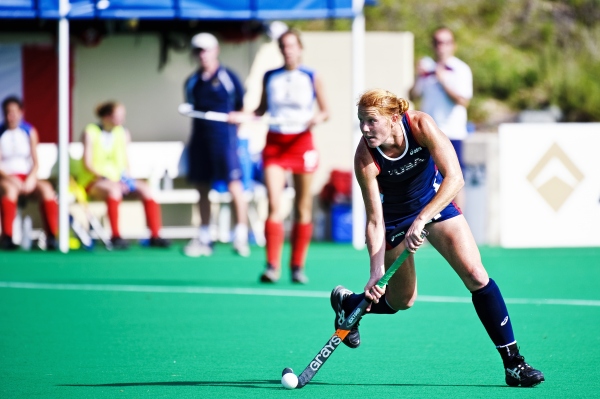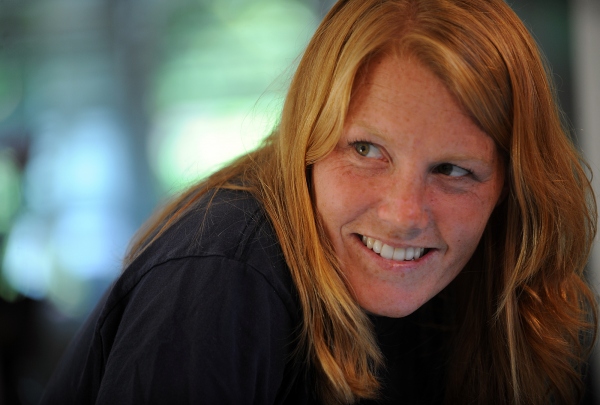Field Hockey: It's Not for Sissies
By Alan Abrahamson | 1/24/12 |
The odds were still pretty fair that Carrie Lingo might well have made the 2012 U.S. Olympic women’s field hockey team.
Even though her knee is so leaky that — if you’re easily grossed out don’t read these next few words — she was bending down a few weeks ago and clear liquid shot straight out and traveled, oh, three to five yards.
That, mind you, was after the seventh surgery to that same right knee. “It’s a part of sports that people don’t realize,” she was saying a few days ago. “It’s as much a part to repair to your body as it is to train. It’s true.”
Over 190 international matches, a career with the U.S. national team that ran for a decade and that included the 2008 Olympics, two Pan Am Games silver medals and a featured spot in the 2010 ESPN Body issue, Carrie Lingo pretty much got to do it all.

The thing is, she probably could have kept on going.
The Olympics are coming up fast. And last year, when she was maybe at 60 percent, she had nonetheless been selected for the U.S. team headed for Dublin, Ireland, and what’s called the Champions Challenge, a tournament for teams ranked No. 7-14 in the world. She said, no, I’m not going to go — take someone else.
“The biggest thing for me this last year — I have been trying to get my body back,” she said. “Obviously, the London Games are coming up. I said to myself, ‘OK, Carrie, you’re never going to be satisfied because you can’t be [going] 100 percent anymore. The second I realized that — I was done.”
What is not well-understood by those who have only a passing familiarity with field hockey is just how physical the sport can be. Sure, the women wear skirts. “It’s funny,” Carrie Lingo said when asked if she’d had concussions. “I’ve had two big ones. I’ve had teeth knocked out. Broken fingers. Stitches. It’s the usual, for sure. All my injuries are very common.”
The sport also involves intense lateral movement and cutting. That’s hard on the knees. That led to her first knee surgery, in 1998, when she was playing on the under-19 U.S. team. She tore her ACL in a practice session. They took her to the hospital ER; her knee was, as she said, “fully dislocated, everything was shifted” but there was an awful lot of attention being paid to someone else in the ER: Charlie Sheen.
This was near Los Angeles, of course.
“Ohmigosh,” she said, recalling the scene. “I was sitting there and, come on — my leg is out of place.”
She recovered from that and went on to star at the University of North Carolina.
In 2003 — surgery No. 3 — required more work on that ACL and, as well, a micro-fracture. The doctors told her she would never play again.
Her response: “I’m like, ‘Thanks for your input.’ “
She came back and trained a year with the men’s program.
If it sounds like Carrie Lingo is a football player — well, that’s what her parents say as well. “The surgeries have been part of the job. Oh, man,” she sighed.
It’s why she decided last week to remove herself from the women’s national team. The knee can probably take the games. It just can’t take the training anymore.

“I cannot speak highly enough of the contribution that Carrie has made to the National Team,” the U.S. women’s head coach, Lee Bodimeade, said in a statement issued by the federation.
“I want to congratulate her on what she has been able to achieve as a player in our sport and wish her every success in her future endeavors. I am positive that the same strengths and attributes that she displayed when playing will ensure success.”
Added Terry Walsh, the technical director of high performance: “Carrie has been one of the cornerstones in the recent development of the USA Field Hockey program. I think her presence will forever be a part of the USA Field Hockey fabric. She has had a major impact on the mentality of the group and the hardship she has endured over the last two years has silently been an incredibly powerful driver for the whole program.”
She said, “It has been an interesting conflict within myself. Obviously, I would give anything to be able to play.” That said, “I understand the cold, hard facts [it takes] to be at the Olympic Games.”

COMMENTS